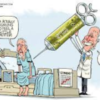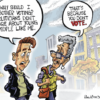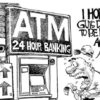Supreme Court blocks Texas law that banned Facebook, Twitter from moderating posts

![]()

A quick note from Cowboy Ron The us supreme court is the only federal builder in Washington to be built below the estimate was supposed to cost ten million but when finished there was two thousand lege over see government can work cowboy ron
Supreme Court blocks Texas law that banned Facebook, Twitter from moderating posts
Associate Justice Samuel Alito wrote in a dissent that it is not yet clear how the high court’s precedents may apply to regulating the internet.
USA TODAY
AD
0:07
- The Texas law would have blocked social media companies from restricting or removing content.
- A federal appeals court in Atlanta blocked enforcement of a similar law in Florida last week.
- Internet trade groups asserted the law would have led to “extremist” material on social platforms.
WASHINGTON – The Supreme Court on Tuesday blocked Texas from enforcing a law banning social media giants like Facebook and Twitter from moderating content – an outcome critics said would have forced “extremist” material onto the platforms.
The Supreme Court’s decision blocks enforcement of the law temporarily while the underlying case continues in lower federal courts.
The 5-4 order was not accompanied by an opinion explaining the decision. Associate Justice Samuel Alito, in a dissent joined by Associate Justices Clarence Thomas and Neil Gorsuch, wrote that it is “not at all obvious how our existing precedents, which predate the age of the internet, should apply to large social media companies.”
In an unusual alignment, Associate Justice Elena Kagan, a member of the court’s liberal wing, joined the three conservatives in saying she would have allowed the law to be enforced but didn’t explain her reasoning.
American Express’ perspective on business travel trends
Chris Marchese, counsel at NetChoice, one of the internet trade groups that sued over the Texas law, described it as a “constitutional train wreck.”
“We are relieved that the First Amendment, open internet, and the users who rely on it remain protected from Texas’s unconstitutional overreach,” he said.
Texas Attorney General Ken Paxton didn’t respond to a request for comment.



















